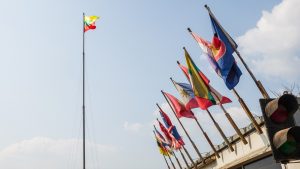A delegation from the Association of Southeast Asian Nations (ASEAN) traveled to Myanmar this week and met with the head of the country’s military junta in a bid to move forward with a possible settlement to the country’s conflict, state media reported yesterday.
According to a report in the Global New Light of Myanmar, ASEAN special envoy Alounkeo Kittikhoun met Senior Gen. Min Aung Hlaing for talks in Naypyidaw on Wednesday. The two “exchanged views on the issues of Myanmar’s cooperation in ASEAN,” the newspaper reported. They also “discussed the best cooperation of Myanmar in ASEAN, the conditions of Myanmar’s participation in ASEAN meetings,” and the bloc’s provision of humanitarian aid to Myanmar. Alounkeo was reportedly accompanied by ASEAN Secretary-General Kao Kim Hourn.
While Myanmar remains a member of ASEAN, the junta has been barred from sending political representatives to the bloc’s top-level summits since late 2021 over its refusal to implement ASEAN’s Five-Point Consensus peace plan. Agreed by the bloc at a special meeting in April 2021, the Consensus called for an immediate cessation of violence and inclusive political dialogue involving “all parties” to the country’s conflict. It also created an ASEAN special envoy to help coordinate and mediate these discussions.
Alounkeo and Min Aung Hlaing also discussed the junta’s increasingly fantastical plans to hold multiparty elections. This has been on the agenda since the coup of February 2021, as a means of staging a transition to a more veiled form of military rule. However, the plans have been repeatedly deferred due to the expanding armed resistance to military rule, which has made it unlikely that the military administration could hold multiparty elections.
Alounkeo’s visit to Myanmar, his second official mission to the country since his appointment as envoy in January, is unlikely to achieve much, except to keep channels of communication open. The Five-Point Consensus has been criticized from its inception, but over time it has become even more out of step with conditions on the ground in Myanmar, where resistance militias and ethnic armed groups have made considerable gains over the past year, particularly in Rakhine, Shan, and Kayin (Karen) states.
Part of the problem with ASEAN’s approach is that it has prioritized meetings with the junta authorities, which continue to be viewed as the default titular government of Myanmar, despite being hotly challenged by the National Unity Government (NUG), which is coordinating the resistance to the junta.
Leaving aside the fact that neither side of Myanmar’s civil war currently has any interest in negotiating – the conflict has long taken on the character of a zero-sum struggle – there is little chance that ASEAN’s envoy can make any progress without engaging the NUG and the other major parties to the conflict. But this is something that ASEAN’s special envoys have been unwilling or unable to do, largely out of concern for transgressing the bloc’s principle of “non-interference” in its members’ internal affairs; the military junta has been harshly critical of any attempt to engage with the NUG, which it has designated a “terrorist” organization.
The Southeast Asian bloc remains divided over the conflict. Some members, particularly Malaysia and Indonesia, have adopted a more elastic interpretation of the principle and pushed for tougher action against the junta. Last year, officials from Indonesia, which held ASEAN’s rotating chair in 2023, held talks with the NUG and other resistance groups. However, Laos, the current ASEAN chair, which appointed Alounkeo the special envoy at the start of the year, is among the member states who have counseled continued engagement with the military regime.

































